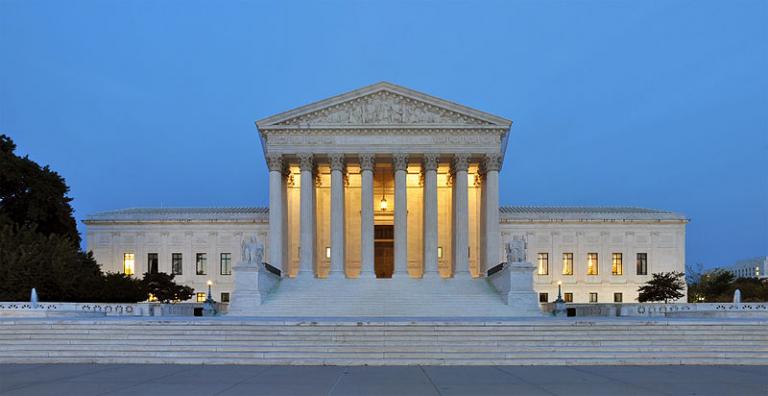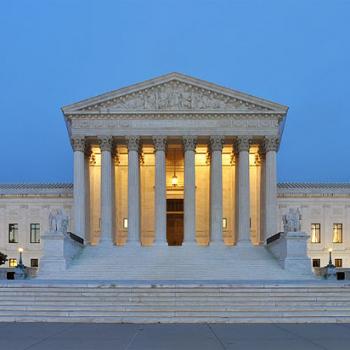
You remember Marbury v. Madison, don’t you? Whether you learned about it in your government class or your history class, you learned that this was the foundational Supreme Court case in which the court established the principle that the job of the Supreme Court is to interpret the Constitution, and, in particular, to determine when a particular act of Congress violates the Constitution, either some aspect of the original text of the Constitution setting out the structure of the government or the Bill of Rights and subsequent amendments.
Hence, in the recent batch of Court decisions, the Court decided that forcing a public employee to pay fees to a union violated the First Amendment because those mandated fees were a form of compelled speech; the Court determined that “warrantless seizure and search of historical cell-phone records, which shows the location and movements of a cell-phone user over a period of more than four months” violated the Fourth Amendment; decided that a California law requiring crisis pregnancy centers to post information on the availability of free Medicaid abortions violated the First Amendment; and determined that the Trump administration’s “order barring most foreign travelers from five Mideast nations with mostly Muslim populations” was within the administration’s powers as defined by the Constitution. The Court also made decisions determining whether certain state actions violated federal laws, for instance, Ohio’s process for removing inactive, apparently-moved voters from its voter registration rolls.
But Roe v. Wade and Obergefell v. Hodges, in which the Court declared that rights to abortion and to same-sex marriage, respectively, are protected by the Constitution, are of an entirely different character. Here’s the rationale for the former:
Roe . . . was based on the right of privacy. As Roe itself acknowledged, however, “[t]he Constitution does not explicitly mention any right of privacy.” Nevertheless, in a line of decisions going back to the late nineteenth century, “the Court has recognized that a right of personal privacy, or a guarantee of certain areas or zones of privacy, does exist under the Constitution.” This right of privacy, “founded in the Fourteenth Amendment’s concept of personal liberty,” the Court in Roe held, “is broad enough to encompass a woman’s decision whether or not to terminate her pregnancy.”
The reasoning behind Obergefell is even more tortured, drawing on Equal Protection and Due Process clauses and, when I read it at the time, really gave me the feeling that Kennedy was working backwards from his preferred result, finding same-sex marriage to be protected by the Constitution, to finding proof-texts in the Constitution and precedent cases. Consider his closing paragraph:
No union is more profound than marriage, for it embodies the highest ideals of love, fidelity, devotion, sacrifice, and family. In forming a marital union, two people become something greater than once they were. As some of the petitioners in these cases demonstrate, marriage embodies a love that may endure even past death. It would misunderstand these men and women to say they disrespect the idea of marriage. Their plea is that they do respect it, respect it so deeply that they seek to find its fulfillment for themselves. Their hope is not to be condemned to live in loneliness, excluded from one of civilization’s oldest institutions. They ask for equal dignity in the eyes of the law. The Constitution grants them that right
Which is why I’m inclined to think that what we’re really seeing, both in terms of the justices making these decisions, and the (portion of) the public responding favorably to those decisions, and now seeing them as nothing other than the recognition of inalienable human rights, is an entirely different way of viewing the Supreme Court. The Court’s job is not something as old-fashioned and stuffy as interpreting a document written over 200 years ago, neither strictly nor trying to take into account 21st century norms and expectations. Instead, they believe, the Court’s job is to make decisions based on universal norms of justice and fairness, whether or not the Founding Fathers wrote them into the Constitution or an amendment to the effect had been passed in the meantime. It’s a new Marbury v. Madison, taken together, a declaration that the Court makes its decisions based on its interpretation of universal principles rather than Constitutional text.
Unions are important, so nothing should stand in their way.
At the same time, Corporate money is bad, so the government should stand in its way.
Gerrymandering is unfair, so it must be stopped regardless of whether the Constitution has anything to say about it or whether, according to definitions of “standing,” anyone is in a position to object.
The entire structure of the election system, in which districts are apportioned in ways that concentrations of a given party in urban areas “naturally” disadvantage them, and, for that matter, small states have the same representation in the Senate as large states, is unjust.
etc.
And, relevant for the present case of Justice Kennedy’s pending departure and the appointment of a new justice to replace him, is the right to abortion a Supreme Court precedent, vulnerable to being overturned if a new Court finds that its predecessor exceeded its authority in defining such a right, when such legislation would ordinarily be handled at the state level, or was it the recognition of a fundamental human right which cannot be removed without perpetrating a monumental injustice on women?
Of course, Roe’s supporters are not willing to come out and say that they believe that the Supreme Court’s role is far more expansive than deciding whether laws follow the U.S. Constitution. They talk about “equal protection” instead (because, the rationale goes, women need abortion in order to attain full equality with men), but the hysteria we’re now witnessing with respect to Trump’s potential nominees, and demands that the Democrats in some way force a delay in the appointment process until they are again able to control it, certainly seems to me to come out of an unspoken greatly expanded role of the Court that only makes sense if you view it as a complete shift in function.
This is no longer a matter of bemoaning or celebrating whether the next justice is conservative or liberal, but a matter of two completely different visions for what the Court is about. To be sure, it looks like, what with Trump, the traditionalist version has the upper hand, for now at least. But whether the expansive vision even truly protects human rights isn’t itself obvious, in the long run, considering that many European courts (and that of Canada) feel that their mission to protect some universal rights (e.g., to a notion of “human dignity”) requires them to curtail other rights (e.g., when individual speech is deemed to violate the “human dignity” of a person or a religious or social group).
So, hey, at the end of this rambling post, Happy Independence Day!
(And here I apologize; as I typed this it felt more and more familiar, and it turns out I had written something similar a couple years ago.)
Image: https://commons.wikimedia.org/wiki/File:Panorama_of_United_States_Supreme_Court_Building_at_Dusk.jpg; Joe Ravi [CC BY-SA 3.0 (https://creativecommons.org/licenses/by-sa/3.0)], from Wikimedia Commons












